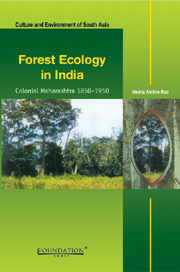Book contents
- Frontmatter
- Contents
- Preface
- Glossary
- Maps
- 1 Introduction
- 2 Pre-Colonial Maharashtra
- 3 Early British Management of Forests
- 4 Evolution of Forest Policy and Forest Acts of 1865 and 1878
- 5 Implementation of 1878 Act
- 6 Forest Policy During 1900–1950
- 7 People's Resistance
- 8 Conclusion
- Appendix - I
- Appendix - II
- Bibliography
- Index
4 - Evolution of Forest Policy and Forest Acts of 1865 and 1878
Published online by Cambridge University Press: 26 October 2011
- Frontmatter
- Contents
- Preface
- Glossary
- Maps
- 1 Introduction
- 2 Pre-Colonial Maharashtra
- 3 Early British Management of Forests
- 4 Evolution of Forest Policy and Forest Acts of 1865 and 1878
- 5 Implementation of 1878 Act
- 6 Forest Policy During 1900–1950
- 7 People's Resistance
- 8 Conclusion
- Appendix - I
- Appendix - II
- Bibliography
- Index
Summary
The British administration had a basic mistrust for anything that was Indian, the Indian traditions or their administrative patterns. They lacked confidence in the capacity of Indians to look after themselves. This was “juxtaposed with the essential assumption that the essence of all human endeavour was realised in the West; in their rational and progressive institutions, in the scientific thought. The essence of Indian civilisation was the very opposite of the West and was expressed in the irrational practices of Hinduism and the Eastern system. Therefore the legitimisation of British rule was derived from the self-validating argument that India was essentially incapable of self governance”
Much of their opinion about Indian forest administration, rather the lack of it, was reflected from time to time in their official accounts. The Forest Department was founded on the assumption that the Indians lacked sense of conservation. This was the opinion held by a majority of the British administrators, though there were a few exceptions. The culmination of this feeling gave birth to the Indian Forest Act of 1865. To further consolidate and legitimise their control over forests, the British successively passed the Forest Act, VII of 1878 amended by Act V of 1890, Act XII of 1891, Act V of 1901 and Act XV of 1911.
The 1865 Act empowered several local governments to declare certain areas as State Forests without in any way interfering with the rights of the people. As per the Act, government forests meant land covered with trees and brushwood or jungle. A revenue official and not a forest official determined the merits of a particular block of forest chosen for reservation.
- Type
- Chapter
- Information
- Forest Ecology in IndiaColonial Maharashtra, 1850-1950, pp. 64 - 108Publisher: Foundation BooksPrint publication year: 2007



